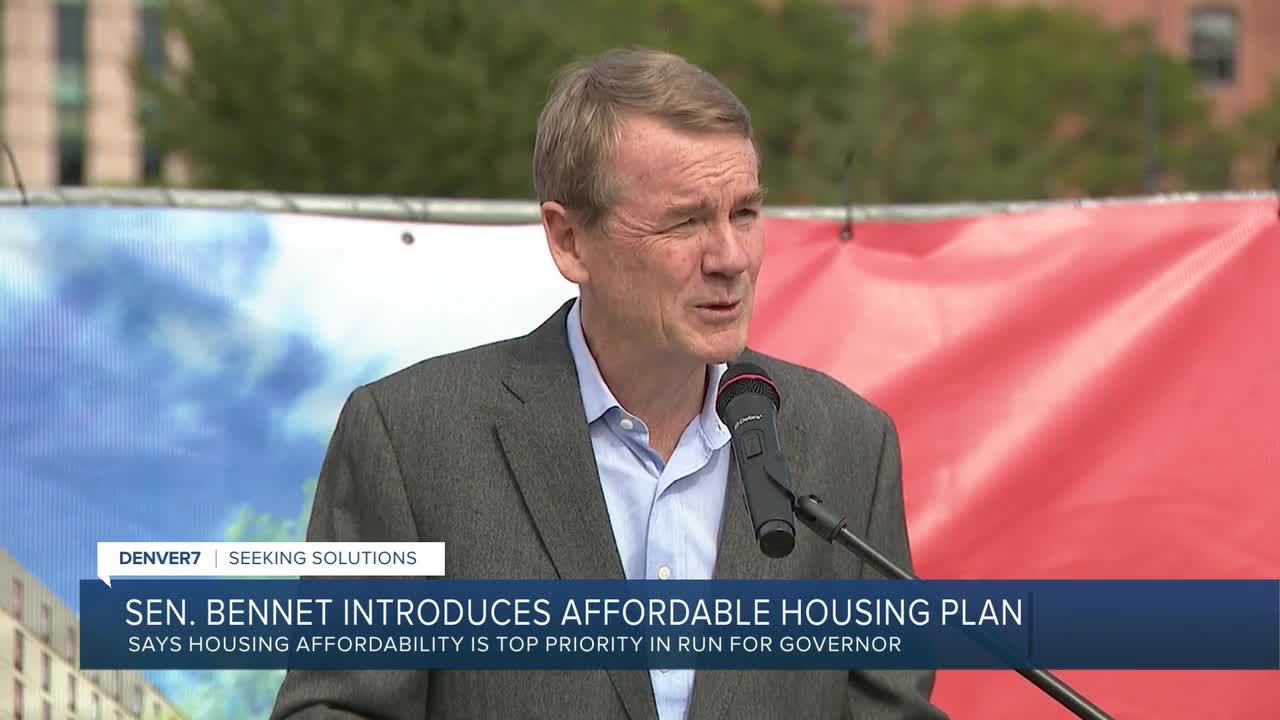DENVER — US Senator Michael Bennet, one of the prominent Democratic candidates in the race to become Colorado's next governor, shared his plan to address the state's affordable housing crisis on Monday.
Bennet said everywhere he goes in Colorado, he hears the same story: people love the state, but are not sure if they can afford to stay.
"We are in a housing crisis that threatens families, communities, and our economy, and we have to address it," Bennet said during a press conference Monday. "The truth is, it's getting harder and harder for all of Colorado's workforce to afford to live here anymore."
Bennet explained a number of strategies he believes can solve the problem.
"We will drive a statewide surge in home construction," Bennet said. "Colorado faces a shortfall of roughly 106,000 units. We must build enough to keep pace with current demand, but also close the gap in supply."
- Read his full plan below
That would be the first part of his plan: increasing the supply of state-supported housing by 30% by 2035. His plan continues to support first-time homebuyers with an emphasis on more starter homes in Colorado, while preserving the affordable housing that already exists in Colorado.
Bennet also addressed the rising construction costs.
"Since 2019, construction costs in Colorado are up more than 50%," Bennet claimed. "To bring costs down, I will expand low-income, low-cost financing for housing and necessary infrastructure, offer land at below market rates where it makes sense, and grow workforce pathways into construction and innovative building."
- Watch Bennet's full press conference in the video player below
In addition, Bennet wants the state to adopt a single, common application for all state housing finance entities. Andy Proctor, the director of Metropolitan State University of Denver's FHLBank Topeka Affordable Housing Institute, explained why that singular application would be an important part of Bennet's plan.
"If you're applying for a multifamily project that's affordable in Denver, you might do three different applications: one to the Colorado Housing Finance Authority, one to the City of Denver, one to the State of Colorado," Proctor said. "So, if you could reduce that point of friction, that would be helpful, and not having three different review timelines."
Bennet's plan also utilizes private sector investment to deliver on the results he wants to see.
"The government can't do this alone. We need to unleash the private sector to unlock billions of dollars in investment," Bennet said.
"If you look nationwide, 38 of the top 50 affordable housing developers are for-profit organizations, private sector organizations. So, involving the private sector in helping to solve affordable housing challenges is nothing new at all," Proctor said.
Through secure funding for rental and utility assistance, along with legal aid, mediation, and case management, Bennet hopes to address the "root causes of housing instability."
"From what I understand about Senator Bennet's proposal, it is comprehensive, and it does create these sort of overlapping solutions," Proctor said. "Each of these alone might not be the solution. I think if you take incrementally each one of these, or some subset of them, I think it'll help make a difference."

Denver7 360 | In-Depth News
Effort to build more affordable housing in Denver led to spike in luxury builds
When pressed, Bennet did not attribute a monetary figure to his plan.
State Senator Mark Baisley (R - District 4) believes Bennet's plan is "too much government involvement to try to solve government problems." Baisley, who is also running for governor, said the solution lies in the free market.
"We need to be very careful about injecting government into that free market formula because it just messes it up every time," Baisley told Denver7. "Try to get our economy cooking so that we don't worry about the word 'affordable housing' because people will be able to afford their homes because they have good-paying jobs."
Colorado has not elected a Republican governor since 2002, but several Republican lawmakers are vying to become the state's next governor.
Earlier this month, State Senator Barbara Kirkmeyer (R - District 23) announced she was throwing her name into the race. Kirkmeyer did not have time for an interview about her affordable housing plan on Monday, but sent Denver7 a statement, saying, "These are more of the same failed policies we’ve seen from the current administration. They’ve promised solutions for years, yet Colorado has only become one of the most unaffordable places to live in the country. We don’t need more boilerplate ideas recycled from D.C., we need real, innovative solutions that actually lower costs. We need policies built on partnership with our communities, not heavy-handed state mandates."
State Representative Scott Bottoms (R - District 15) is also running for governor. He sent a statement to Denver7, which said affordable housing is a "top priority," with three steps in his plan: cutting the red tape by fast-tracking permits and approvals for projects, opening state-owned parcels of land near transit for homes, and linking state infrastructure dollars to communities building housing complete with a public dashboard for voters to track progress. Bottoms would also like to end property taxes, if elected.
Former Congressman Greg Lopez is another Republican fighting for the position. His team sent Denver7 an outline of his plan to address affordable housing, which focuses on adding more starter homes to Colorado.
We asked Colorado Attorney General Phil Weiser for an interview or comment about his plans for affordable housing, but he declined.
Voters will decide who the next Colorado governor is on Nov. 3, 2026.




